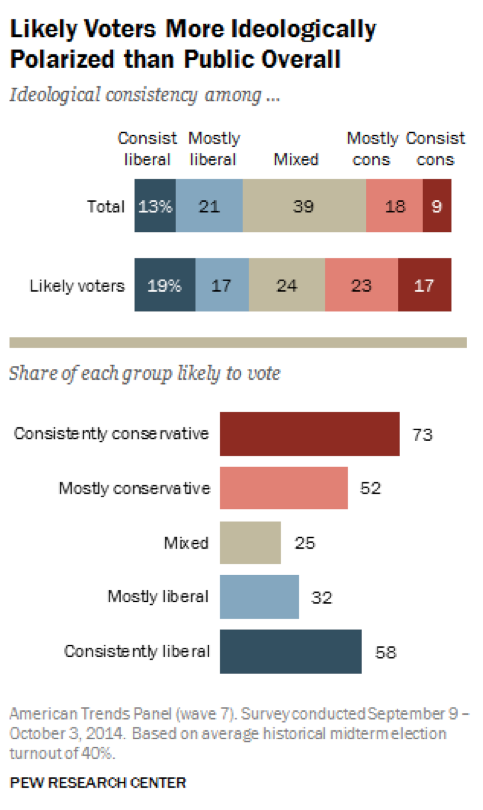
Civic engagement essential to strengthening democracy
Kelly Born is a program officer for the William and Flora Hewlett Foundation. The original version of this post appeared on the Hewlett Foundation blog.
Even before voter turnout hit a 70-year low in 2014, many of us in the democracy reform field were in conversation about whether and how we might improve voter turnout, and civic engagement writ large. This, in part, is why the Hewlett Foundation recently announced that we will be partnering with Knight Foundation, the Democracy Fund and the Rita Allen Foundation on a $3 million challenge to identify how we can better inform voters and increase civic participation before, during and after elections.
Pew Research Center, “Political Polarization in the American Public” study.
A recent post here on Knight Blog elaborates on the goals of this election-focused Knight News Challenge: “We are looking for innovative ideas ranging from new ways that news media and others can inform voters, to making voting easy, efficient and fair, to converting election participation into longer-term civic engagement, on the local, state or national level.”
The challenge opened today, but here at the Hewlett Foundation we have been focusing on these issues for some time. Our Madison Initiative seeks to create opportunities for deliberation, negotiation and compromise in the U.S. Congress. But it’s clear that civic engagement is an essential component of strengthening representative institutions. Indeed, many Americans opt out of the civic process. As the Pew Research Center reported last year, “[M]any of those in the center remain on the edges of the political playing field, relatively distant and disengaged, while the most ideologically oriented and politically rancorous Americans make their voices heard through greater participation in every stage of the political process.”A recent post here on Knight Blog elaborates on the goals of this election-focused Knight News Challenge: “We are looking for innovative ideas ranging from new ways that news media and others can inform voters, to making voting easy, efficient and fair, to converting election participation into longer-term civic engagement, on the local, state or national level.” RELATED LINKS
“Knight News Challenge: Elections Mixtape” by Knight Foundation
“Towards empathetic disruption: Civic tech and doing what works” by John Bracken and Lucas Hernandez on Knight Blog, 03/04/15
“Democracy Works launches new voter tool, expands programs” by Seth Flaxman on Knight blog, 03/04/15
“Better informing voters and increasing civic participation focus of new $1.4 million support to Democracy Works from Knight Foundation and MacArthur Foundation” – press release, 3/4/15
“Balancing technology risks and benefits in elections” by Jeremy Epstein on Knight blog, 03/02/15
“To improve civic participation we need transparency” by Chris Gates on Knight blog, 02/26/15
“Civic engagement essential to strengthening democracy” by Kelly Born on Knight blog, 02/25/15
“Knight News Challenge on Elections offers more than $3 million for innovative ideas” – press release, 02/25/15
“Knight News Challenge on Elections opens for ideas” by Chris Barr and Shazna Nessa on Knight blog, 02/25/15
“Knight News Challenge to focus on Elections” on Knight blog, 02/12/15
The Madison Initiative is strictly nonpartisan and agnostic about specific policy outcomes. But we think that representative institutions can be, well, more representative when more of the electorate participates in the process.
For the Hewlett Foundation, this partnership represents a unique opportunity to work with leading peer funders to support new and promising ideas from people across the media, technology, and election administration fields. We hope to see ideas and collaborations from civic technologists, academics, students, startups, nonprofits, governments and individuals.
The News Challenge closes on March 19, and I have no doubt that the ideas that arise will engage and inspire us all!
To submit an entry for the Knight News Challenge or provide feedback on other submissions, visit newschallenge.org. Knight News Challenge: Elections closes on March 19 at 5 p.m. ET.
Recent Content
-
Journalismarticle ·
-
Journalismarticle ·
-
Journalismarticle ·


